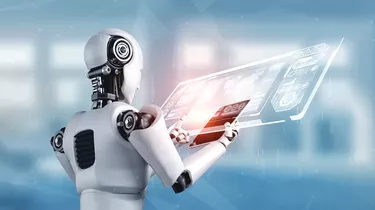
If you ever had to file an accident claim with your car insurer, you likely went through the process of having a person inspect the car's damage at your home or a repair center and then needing to wait for an official estimate and approval to go ahead with getting the necessary repair work done. While the traditional process can be lengthy and keep your car off the road longer than you'd like, artificial intelligence can now play a role in speeding up the process by taking over the appraiser's work.
GEICO is one insurer that has recently announced adopting this technology through Tractable. Here's what you should know about it as a customer.
Video of the Day
Video of the Day
Consider also: How to add a car to a GEICO Insurance Policy
How Artificial Intelligence Works for Insurance
In contrast to humans inspecting the vehicle and handling the whole appraisal process, car damage detection with AI uses a system containing photos of vehicles with various levels of damage from past insurance claims. So, a GEICO customer would first contact GEICO to report an accident online or by phone. The assessment process would then start by having a person such as a GEICO repair center worker upload images of the damaged vehicle. The AI system would take those images and do a comparison to other cars that have similar issues.
While taking advantage of artificial intelligence for a car accident claim has benefits, the technology lacks perfection and may not provide an accurate estimate in all cases.
The tool can then provide an initial estimate based on its findings and can flag an estimate for further review if it suspects a potential problem. The insurance company's claims team can do a manual review and make adjustments in the rare case of an inaccurate car damage estimate with AI. The claim would then go through the resolution process where the insurance company looks at the details of the accident and damage, checks the customer's policy and comes up with a payment if the claim should be approved.
After the insurer has approved the claim, then the customer can go ahead with getting the vehicle repaired or otherwise receive the compensation owed. For example, GEICO customers would have the work done at GEICO authorized repair center locations.
What AI Offers Car Insurance Customers
The biggest benefit that customers can expect from car damage detection with AI involves the potential to significantly speed up the claims process. For example, Tractable notes it can take around half an hour for a human to appraise a vehicle for damage. With all the claims that come through, this workload can become a lot for an insurance company to handle efficiently, especially during the age of COVID-19 when staffing may be an issue. Using AI for car accident damage estimation can cut this time down to just a few minutes and ultimately help customers get their claims approved faster.
The use of AI for car insurance claims also has the potential to improve consistency in estimates so that customers are more likely to get fair compensation for their claims. Since people can vary in their inspections and valuations based on experience and even issues like decision fatigue, the traditional car damage assessment process can become more subjective at times. So, using AI can help lower the risk of human errors and biases.
Consider also: Car Insurance Basics
Why AI Can Be a Concern
While taking advantage of artificial intelligence for a car accident claim has benefits, the technology lacks perfection and may not provide an accurate estimate in all cases. For example, the technology can work well for outside damage to a car, but interior damage would present a challenge likely better handled by a human appraiser. Further, the system will only be as good as the data it uses. So, if the car accident photos lack a good resolution, variety in angles or diversity in vehicles and damage types, then such issues can reduce the precision of the estimate.
Privacy issues can also come into play with the use of car damage detection with AI. Some customers may not feel comfortable having images of their vehicles put into the system for future use, especially if the images will show personal information like a license plate. Therefore, the companies involved will need to let customers know how and how long their car damage images will be used and whether they can opt out of staying in the system.
Consider also: Check Your Car Insurance for COVID-19 Rebates
- PR Newswire: GEICO Partners With Tractable To Accelerate Accident Recovery With AI
- Tractable: Assess All Your Estimates in Minutes and Highlight Inaccuracies
- Consumer Financial Protection Bureau: What Happens When I File an Insurance Claim?
- GEICO: How GEICO Handles Your Car Insurance Claim
- Altoros: Why Estimating Car Damage with Machine Learning Is Hard